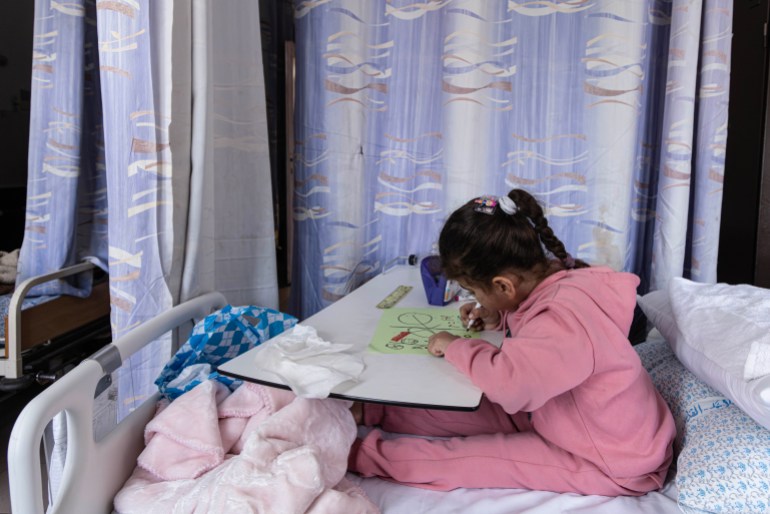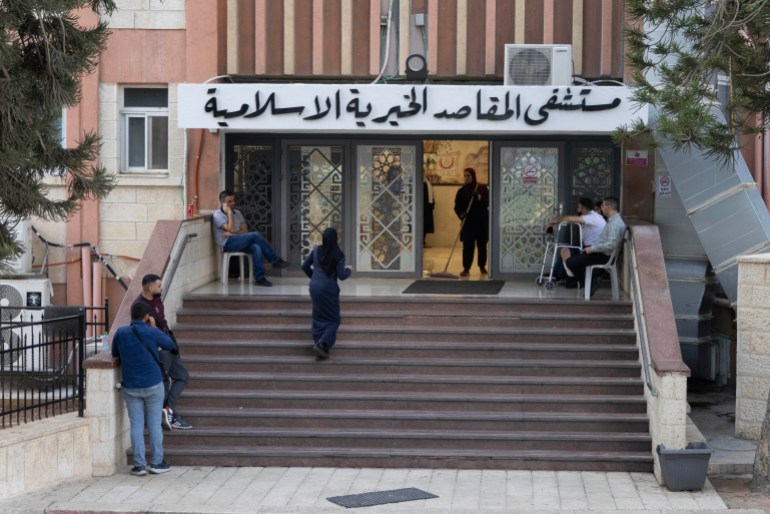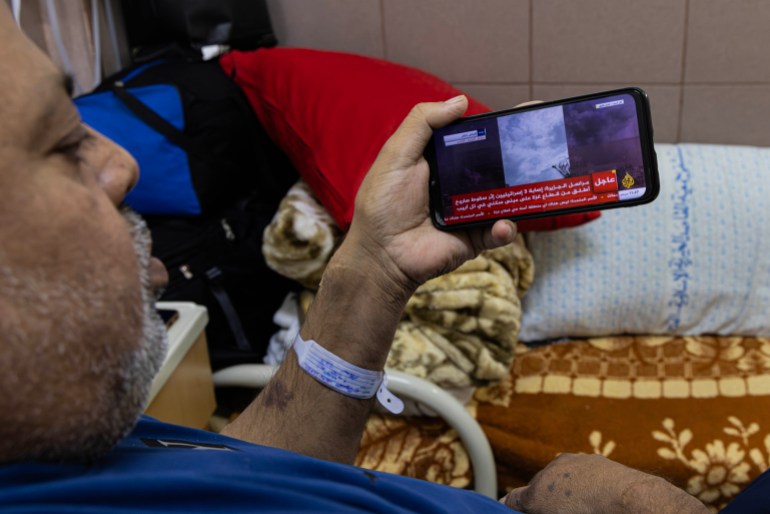Jerusalem – Saeb Ali al-Tanani, 14, has a tumour in his leg. Last Wednesday, Suhaila, his grandmother, was with him as he wheeled himself down the corridor at Makassed Hospital in occupied East Jerusalem.
“He has to do genetic and blood tests, so he will be here a while,” Suhaila said, while remembering their family in Gaza. “Our hearts break for what our family are going through in Gaza.”
Saeb echoed his grandmother’s worries. “We are scared for our family,” he told Al Jazeera. “I want to go back to my home.”
A day later, fear would come to haunt the hospital itself.
On Thursday, Israeli forces arrested Suhaila. She is one of 12 Palestinians in detention who were either receiving treatment at Makassed Hospital in occupied East Jerusalem, or were acting as medical chaperones for patients.
According to a statement by the Israeli police, the Palestinians were staying “illegally” at the hospital, after their medical permits, issued by the Israeli military, expired.
“In a joint operation by the Jerusalem District Police and Jerusalem security guard soldiers, 12 female and male suspects residing illegally in Israel were identified and arrested,” the police said in a statement, adding that the deputy director of the hospital was also summoned for interrogation.
“Of these, 11 residents of the Gaza Strip are suspected of remaining in the hospital over the past few weeks in violation of the law, and the other suspect is a Palestinian who [is] residing in Israel illegally.”
Four men and seven women from Gaza were arrested, the statement said.
تغطية صحفية:”جانب من اقتحام قوات الاحتلال مستشفى المقاصد في بلدة الطور بالقدس المحتلة”. pic.twitter.com/Ux5gV5YrpB
— فلسطين بوست (@PalpostN) November 2, 2023
(Translation: [Israeli] occupation forces storming Al-Makassed Hospital in the town of al-Tur in occupied Jerusalem.)
Samira Aweina, a hospital attendant at Makassed, said dozens of Israeli police and soldiers raided the hospital on Thursday.
“They all came in at once, and immediately sealed off the other entrances,” she said.
“They arrested a group of elderly women from the emergency room with the young children they were with,” she continued. “They arrested one of our patient’s father, and another patient’s grandmother.”
Qaddoura Fares, the head of the Prisoners and Ex-Prisoners Affairs Commission for the Palestinian Authority (PA), told Al Jazeera that the PA did not have any information on those arrested.
“The occupation authorities did not provide us or the Red Cross any details about the detainees from Gaza,” he said, speaking from the occupied West Bank city of Ramallah. “We don’t even know where they are being held or what their names are.”
Usually, Israel provides the International Committee of the Red Cross (ICRC) with the names of Palestinians it has arrested. The Red Cross in turn informs the PA. The role of the ICRC typically includes visiting detainees and restoring contact between family members.

‘I want Mama and Baba’
Other patients and their accompanying relatives said they are stuck in limbo, unable to go home, and forced to stay at the hospital.
Imm Taha al-Farra is with her nine-year-old granddaughter Hala, who underwent a spinal operation on October 7.
“We were supposed to go back after a few days,” Imm Taha said. “We can’t go back now. We don’t know anything. How are we supposed to go back?”
Hala, who said she wants to be a doctor so that she can treat children, has been asking to go home for weeks.
“I want Mama and Baba,” she said. “I miss my brothers Omar and Ali.”
Their family live in Khan Younis in southern Gaza. Imm Taha said the families of her nieces and nephews, all 16 members, were killed in an Israeli air raid on their home.

Another patient, Mahdiya al-Shanti, has also been in the hospital for more than a month.
“I was supposed to go home towards the end of October, but now I can’t because of the war,” the 20-year-old from northern Gaza said.
“It’s hard to know how my family is doing all the time because the internet cuts off and sometimes they can’t charge their phones,” she continued. “They fled the north to Khan Younis but since there’s no safe place in Gaza it’s like they went from one danger zone to another.”
Mahdiya’s father had accompanied her as a medical chaperone. He too was among those arrested by Israeli forces last Thursday.
Mahdiya said that the forces stormed the hospital and barged into patients’ rooms and the rooms where the medical chaperones stay.
“They said they were looking for anyone from Gaza,” she said.
She quickly sent a message to her dad, who was in one of those rooms, warning him that the Israeli forces were around. But it was too late.
“I don’t know where they’ve taken him,” Mahdiya said. “How can they do this in a hospital? Now I’m all alone and sick with worry. My family is in Gaza, my father is missing, and I am a patient here all by myself.”

Hospital stay in the balance
There are six Palestinian hospitals in occupied East Jerusalem offering medical specialties that the Palestinian health ministry is unable to provide in the occupied West Bank and Gaza Strip.
According to Medical Aid for Palestinians (MAP), more than 50 percent of patients in these hospitals are referred from the occupied territories.
Makassed Islamic Charitable Society Hospital was established in 1968 and included 60 beds. The hospital continued to expand, and now has 250 beds, making it the main referral hospital for the Palestinian community in Jerusalem, the West Bank and the Gaza Strip.
According to the administration of the Makassed Hospital, there were 53 patients from the Gaza Strip, each with one chaperone from their family, when the Israeli security forces raided the institution. The hospital, which said it was not authorised to give statements on the Thursday raid to the media, declined to say how many of the Gaza patients and chaperones remained.
Doctors have spoken about the fear of reprisals if they speak – including the prospect of arrests or losing their jobs.
As for the patients from Gaza, their anxiety over what’s happening to their families in the coastal enclave is compounded by their own unfamiliar situation.

Nafez al-Qahwaji, who was referred to the Makassed Hospital by the Nasser Medical Complex in Khan Younis, spent three days in the hospital before the war began.
“The Israeli intelligence called my number and told me to evacuate my home in Khan Younis,” al-Qahwaji said. “I called my children immediately and told them to leave the house for fear that it would be targeted. Now they are sheltering at a UN school.”
Al-Qahwaji declined to disclose what he was getting treated for, and initially thought he would only stay for a week or two.
“I don’t have appropriate clothes now that winter is coming,” he said. “I don’t know how I will go back home if Erez is destroyed,” he added, referring to the Israeli checkpoint in northern Gaza that is also known as the Beit Hanoon crossing.
(Linah Alsaafin reported from London, United Kingdom)









